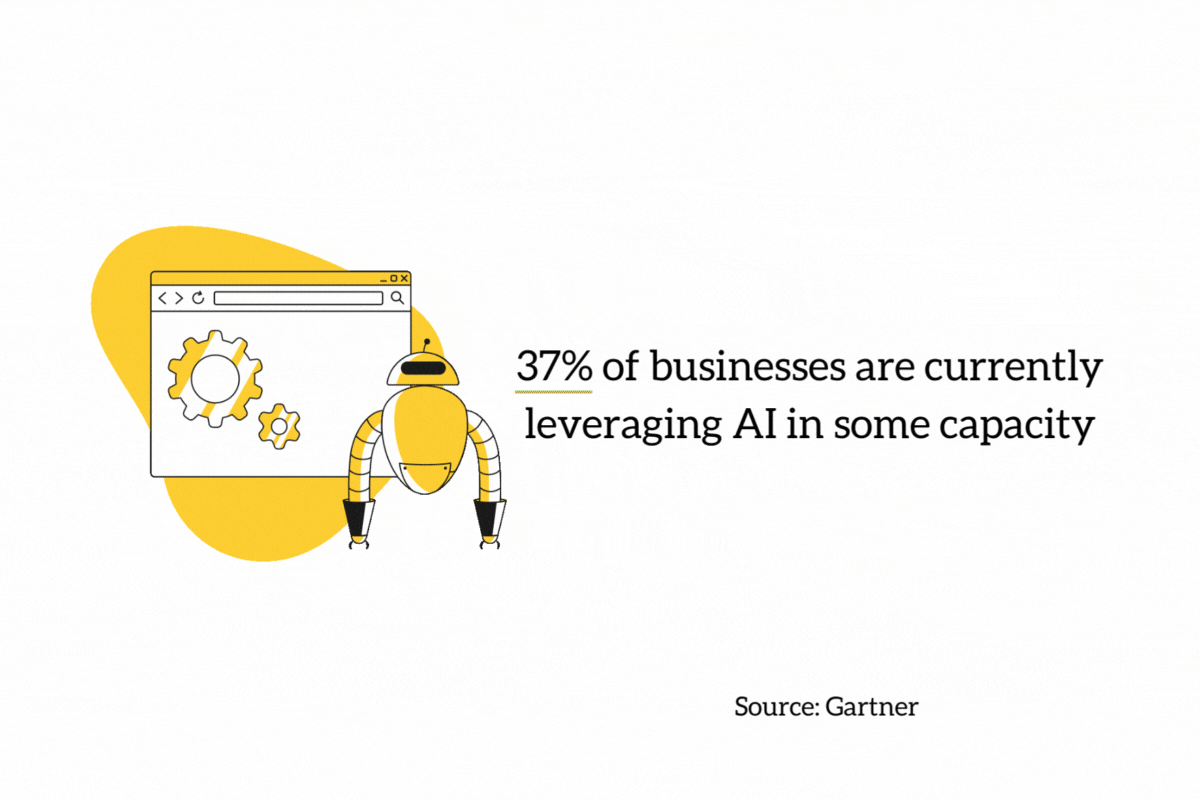Today’s world isn’t exactly what the fortune tellers of the past had in mind. Things are different and new every day, with pals like ChatGPT and other AI technology patting us on the proverbial back as we navigate this whole new world and leverage technology to make our day-to-day easier and better.
So in today’s fast-paced and data-driven business landscape, gaining a competitive edge is crucial for long-term success. Artificial Intelligence (AI) and Machine Learning (ML) have emerged as transformative technologies that can revolutionize how businesses operate. In fact, according to one study by Gartner, up to 37% of businesses are currently using AI in some way.
By harnessing the power of AI and ML, organizations can unlock valuable insights, automate processes, enhance customer experiences, and make informed decisions faster than ever before. We wrote this blog to help you think about ways AI might be able to enhance your business. It’s not meant to be an exhaustive list of all the emerging AI tools. With that said, let’s get into the seven ways in which AI and machine learning can give your business a competitive edge.
Fraud Detection and Cybersecurity
In today’s digital landscape, cybersecurity threats and fraud attempts are on the rise. AI and ML play a vital role in detecting and preventing these malicious activities. Machine learning algorithms can analyze vast amounts of data to identify patterns and anomalies that may indicate fraudulent behavior.
By deploying AI-powered fraud detection systems, businesses can minimize financial losses, protect customer data, and maintain their reputation all through digital, automated means. By staying one step ahead of cyber threats, organizations can build trust with their customers and gain a competitive advantage in an increasingly digital world.
Cybersecurity is also at the forefront of discussions surrounding the usefulness of bots like ChatGPT, which can be leveraged to write inappropriate or even malicious code. While they are written to be forthcoming about their wholesomeness and good-hearted intent, GPT can still be leveraged for nefarious purposes, leading many to question its long-term worthiness.
When using generative AI, keep these tips in mind to keep you and your business safe from risk:
- Be aware that there is very little regulatory oversight around bad actors and copyright law, so take appropriate precautions to protect your organization’s data and intellectual property.
- Remember that AI algorithms are only as good as the data they are trained on, so don’t treat the output of an AI system as a definitive fact.
- Avoid inputting confidential or sensitive information into an AI system, as doing so could put your organization at risk of a data breach or other security incident.
Data-Driven Decision Making
One of the most significant advantages of AI and ML is their ability to process and analyze hugeeeeeee amounts of data quickly and accurately. By leveraging AI algorithms, businesses can make data-driven decisions based on real-time insights that add up to real dollars and cents in the good. Another Gartner study found 80% of executives believed automation can be applied to any business decision.
AI-powered analytics tools can uncover patterns, trends, and correlations that humans might overlook, enabling organizations to optimize their operations, identify new opportunities, and mitigate risks. By relying on data-driven decision-making, businesses can gain a competitive advantage by being agile, proactive, and adaptable in an ever-changing market.
HBR goes more in-depth on this topic in this article: What AI-Driven Decision Making Looks Like.
Enhanced Customer Experience
AI and ML have revolutionized the way businesses interact with their customers. Through the use of chatbots, virtual assistants, and recommendation systems, organizations can provide personalized and seamless experiences to their customers.
AI-powered chatbots can handle customer inquiries and support requests 24/7, improving response times and overall customer satisfaction. ML algorithms can analyze customer preferences and behavior to deliver targeted recommendations and personalized marketing campaigns. Through an enhancement in the customer experience, businesses can foster customer loyalty, increase retention rates, and gain an edge over their competitors.
One critical way businesses are utilizing AI is through the use of Chatbots, mostly powered by GPT. These bots can not only service customers around the clock but pull from nearly endless troves of data to ensure end-users are receiving the best possible information and experience all in one. In most cases, these bots are nearly indistinguishable from their human counterparts.
Process Automation and Efficiency
AI and ML technologies excel at automating repetitive and time-consuming tasks, freeing up human resources to focus on more strategic initiatives. Machine learning algorithms can be trained to recognize patterns and perform complex tasks with minimal human intervention.
This automation leads to increased efficiency, reduced errors, and significant cost savings. From automating inventory management to optimizing supply chain logistics, businesses can streamline operations and gain a competitive edge by leveraging AI and ML to automate their processes.
Predictive Analytics
Predicting future trends, customer behavior, and market dynamics is crucial for staying ahead of the competition. AI and ML can analyze historical data to identify patterns and make accurate predictions. By utilizing predictive analytics, businesses can forecast demand, optimize pricing strategies, and anticipate customer needs.
This proactive approach allows organizations to make strategic decisions, allocate resources effectively, and capitalize on emerging opportunities before their competitors. Gigantic industry gains are possible through the implementation of predictive analytics.
Organizations like automotiveMastermind and other sales-forward businesses are currently utilizing these types of AI models to take tremendous amounts of data and cycle them through various models, searching for connections humans would otherwise be unable to make. For example, suppose someone wants a better car and is actively searching for an upgrade. AI can analyze what the buyer is looking for (called intent data) and find other buyers with similar intent. Then, the AI can recommend cars that people like them have purchased. This allows dealerships to buy and sell with more accuracy and efficiency, predicting who will need what before the customers even know.
Improved Product Development and Innovation
AI and machine learning can significantly impact product development and innovation processes. By analyzing vast amounts of data, including customer feedback, market trends, and competitor insights, AI algorithms can provide valuable insights to guide product development. Machine learning models can identify patterns and predict consumer preferences, helping businesses design products that resonate with their target audience.
Additionally, AI-powered systems can automate and accelerate the testing and prototyping stages, reducing time-to-market across the board and allowing businesses to stay ahead of their competitors (do you sense a theme yet?).
By leveraging AI and machine learning in product development, businesses can create innovative offerings, tailor them to customer needs, and gain a competitive edge by delivering superior products.
Enhanced Operational Efficiency and Optimization
AI and machine learning can optimize various aspects of business operations, leading to improved efficiency and cost savings. For example, AI algorithms can analyze historical data to optimize inventory management which can predict demand patterns and reduce excess stock or shortages. ML models can optimize production processes by identifying bottlenecks, suggesting process improvements, and predicting equipment maintenance needs to minimize downtime.
AI-powered algorithms can also optimize pricing strategies based on market conditions, customer behavior, and competitor pricing, ensuring businesses offer competitive prices while maximizing profits. By leveraging AI and machine learning for operational optimization, businesses can streamline their processes, reduce costs, and gain a competitive edge by being more efficient than their peers.
Conclusion
In today’s fast-paced and data-driven business world, organizations need to stay ahead of the competition to succeed. By leveraging the power of AI and machine learning, businesses can gain a significant competitive edge in order to keep up with the competition – competition that’s probably already using AI and ML.
From data-driven decision making and enhanced customer experiences to process automation and efficiency, predictive analytics, fraud detection and cybersecurity, improved product development and innovation, and enhanced operational efficiency and optimization, AI and machine learning can transform the way businesses operate and lead to significant benefits.
Embracing these transformative technologies can help organizations stay agile, proactive, and adaptable in an ever-changing market, and ultimately, achieve long-term success. So, don’t get left behind with your artificial hat in your artificial hands – embrace AI and machine learning to take your business to the next level and stay ahead of the curve.
If you’re ready to embrace digital transformation, we can help. Give us a call at (864) 552-1291 and we’ll help you evaluate capabilities and options. Also, sign up for PTG Tech Talk for monthly tech news, and consider following us on LinkedIn, Facebook, and Twitter!

